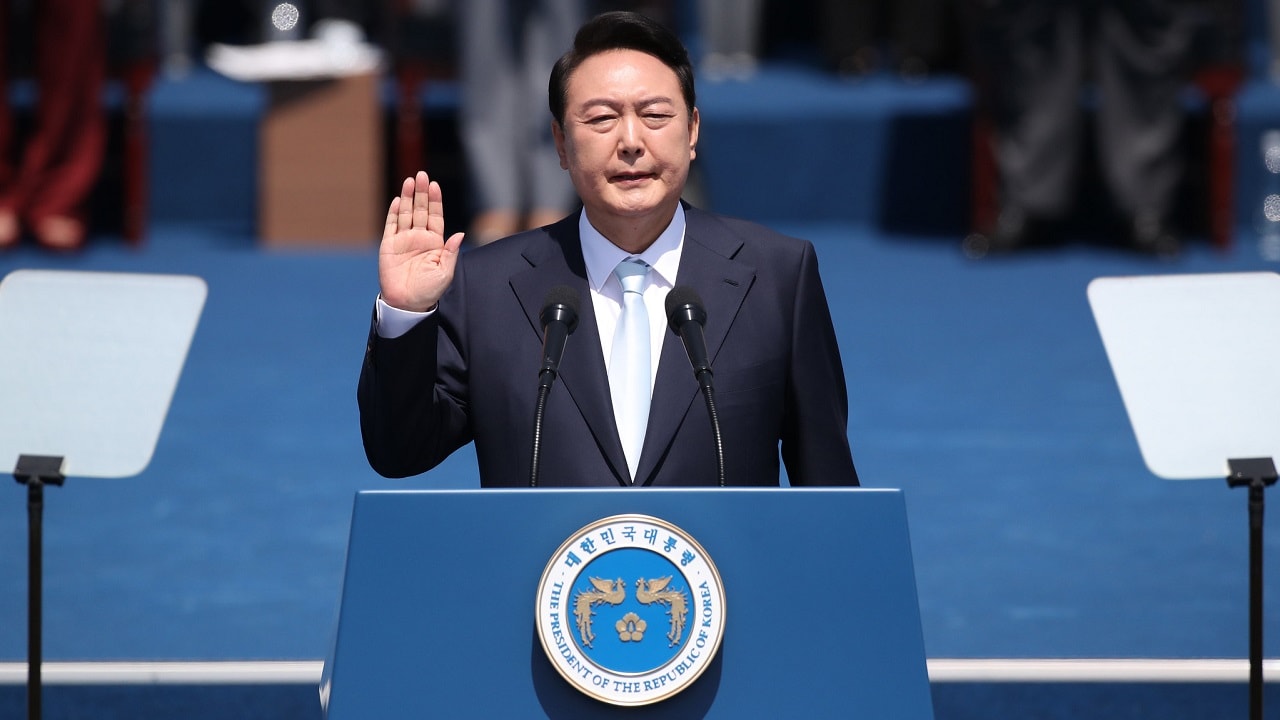South Korea President Yoon Seok-Yeol visited Washington, DC this week. He received a full state visit, complete with a dinner where he karaoke’ d the audience. The US-South Korea alliance has not had this level of comity at the top in years.
Under former US President Donald Trump and former South Korean President Moon Jae-In, relations hit a serious low. The two loathed each other, and Trump, predictably, made sure to express this publicly. Biden and Yoon conversely seem to genuinely like each other. When Yoon spoke in front of Congress, he received standing ovations.
The summit returned two major alliance shifts – one on South Korea’s growing interest in nuclear weapons; the other on South Korea’s potential involvement in a Taiwan scenario.
South Korea will Not Develop Nuclear Weapons – At Least For Now
The biggest news of the ‘Washington Declaration’ is the derailment of the newly rekindled South Korean interest in nuclear weapons. I have written on this several times here at 1945.com (here, here, here). The core argument is that North Korea can, since 2017, strike the US with a nuclear weapon. This, in turn, might lead the US to hesitate to fully fight for South Korea.
We see this in Ukraine, where Russian nuclear threats have inhibited NATO assistance to that embattled country. If Russia did not have nuclear weapons, NATO would almost certainly help Ukraine more. It is reasonable to assume that the US might have such hesitations with other allies and partners too.
The US foreign policy community adamantly opposes South Korean nuclearization however. The Biden administration probably made South Korea’s re-commitment to foregoing these weapons a prerequisite for the state visit. South Korea is a signatory of the Nonproliferation Treaty, and Yoon expressly reaffirmed South Korea’s commitment to it in this trip.
In return, South Korea received yet further assurances of America’s security commitment, plus a nuclear consultative committee with the US. It is unclear how much this committee will actually permit South Korea to jointly plan US nuclear policy in East Asia – probably not much though. This has led to complaints, correct in my opinion, that South Korea did not get enough in return for its NPT re-commitment.
South Korea’s Increasingly Public Stance against a Chinese Attack on Taiwan
The other big take-away of the summit is Yoon’s increasingly vocal support for Taiwan. Yoon, like the Japanese this year as well, has signaled to China that a violent, forced unification with Taiwan is unacceptable. South Korea and Japan have traditionally avoided speaking to this topic because both have extensive trading relationships with China. Both are also proximate to China. Any major conflict with China would be more devastating to them than to the far-away US homeland.
The Ukraine War and China’s hawkish turn under current President Xi Jinping seems to have provoked a re-evaluation. Russia has sought to unilaterally alter borders in Europe by force, and China has stood by it, maintaining the Sino-Russian ‘partnership without limits.’
This has fueled understandable concerns that China might see the Ukraine War as a model or template for its own move on Taiwan. The original Russian plan was for a blitzkrieg – a lightning victory over Ukraine akin to its land-grab of Crimea in 2014. This would present the West with a fait accompli – either accept established Russian control or risk a war with Russia. China surely hopes for this in Taiwan.
Instead, the Ukraine War has turned into a major conflict, dividing the region, disrupting economic relationships, and sparking renewed competition between the West and Russia. A Chinese move on Taiwan would likely go the same way. An extended Sino-US conflict in East Asia would be disastrous and place great pressure on Japan and South Korea to support the US side. South Korea and Japan are likely signaling China not to take such a huge risk.
China’s Missed Opportunity
South Korea’s interest in nuclear weapons and increasing alignment with Taiwan are a serious failure of Chinese foreign policy. Japan was always going to line up with the US against China in a conflict. Japan is the second largest economy in the region; Chinese regional hegemony cannot be prevented without its commitment.
But South Korea had more room to move. As a smaller economy, its alignment against China is not as important, and its geographic placement so close to China long meant US officials were wary of pressuring it too much. South Korea’s progressive party is also wary, for historical reasons, of alignment with Japan.
China could have exploited these fissures and pulled South Korea toward it if it had acted as a responsible regional leader. Most obviously, it could have helped blunt the North Korean nuclear and missile program and gained credit for this in the South. China has great leverage in the North. Instead, China bullied South Korea for installing missile defense against those very North Korean rockets and did nothing to push North Korea toward better behavior. The result is that South Koreans now detest China, giving Yoon the political space to more openly align with America against it.
Dr. Robert E. Kelly (@Robert_E_Kelly; RoberEdwinKelly.com) is a professor in the Department of Political Science at Pusan National University and 19FortyFive Contributing Editor.

